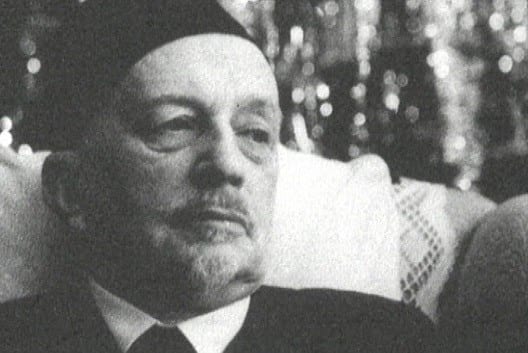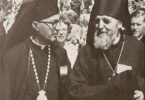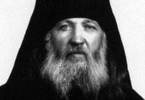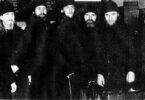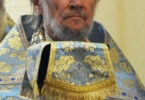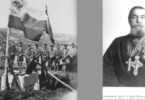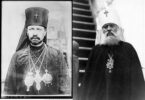From ROCOR Studies
The front line of the Civil War divided the Russian Orthodox Church. This division continued outside Russia and was basically overcome in 2007. Finding themselves as immigrants in 1920 Russian hierarchs continued shepherding the military units of the White Movement, who were dispersed throughout the whole world. Militarily, they were united by the Russian All-Military Union and ecclesiastically by the Russian Orthodox Church Outside Russia (ROCOR).
Their situation as immigrants was conducive to reflections regarding the “Russian catastrophe,” the World War, the Revolution, and the subsequent political resistance. In certain ways these reflections continued the pre-revolutionary polemics in the framework of the Religio-Philosophical Society.
O soprotivleniiu zlu siloi (The Resistance to Evil By Force) written by Ivan Alexandrovich Ilyin (1883-1954) in 1925 was dedicated to the White Army warriors and their leaders. On the basis of the thesis advanced in the title, Ivan Ilyin polemicizes with Leo Tolstoy’s teaching on the non-resistance to evil by violence, basing this not only on the possibility but also on the religious necessity and the moral truth, of resisting evil by way of the “sword”. Noting a certain casuistry and rationality in the book’s construction, Archpriest V.V. Zenkovsky, the historian of Russian philosophy, noted at the same time its authenticity and profundity: “It contains a particular and severe honesty.”
The polemics around this work, which was published a year before the start of the church schism among Russian immigrants was, to a significant degree, in keeping with the political aspect of the division, which had already taken shape, into Orthodox Christians who were either “ultra” or simply conservative, to use conventional terminology. A rebuke to Ilyin that was harsh and polemically sharpened on the part of another Russian philosopher, N. A. Berdyaev, in the 1926 issue of the journal Put’ (“Koshmar zlogo dobra”), clearly delineated both the theological-philosophical and ecclesiastical-political limits of this resistance. On the other hand, as is evident from the following opinion, Ilyin’s worldview was very much in line with the ROCOR First Hierarch, Metropolitan Anthony (Khrapovitsky) of Kiev and Galicia, who, maintaining Orthodox imperial positions, spoke out in favor of continuing armed struggle with Bolshevism, comparing this with the struggle against foreign interventionists during the Time of Troubles and bestowing written blessings upon both Russian White terrorists (the Brotherhood of Russian Truth) and upon Fascists (Anastassii Vosnyatsky’s party).
It cannot be said that a philosophical treatise, expounded not in the most accessible manner, could be extremely popular among most of the ROCOR parishioners. However, it appears to me that this work turned out to be on the whole in keeping with the attitude of ROCOR’s flock since under all of the anti-Communist military regimes (Germany, South Africa, and Chile) those of ROCOR’s posterity have felt comfortable. On the other hand, this work presents to us, the current generation of ROCOR members, a complex philosophical dilemma — doesn’t good become evil, destroying its enemies by force?
I read this thoughtful and interesting book about a month ago and simultaneously wrote a number of notes on the margins, although I was unable to pick up a pen sooner in order to write this requested review, overwhelmed as I was by a multitude of pressing matters. Besides this book four more authors are awaiting my opinion.
The subject treated by the esteemed philosopher I. A. Ilyin is congenial to me. Back in the eighties I gave public talks on resistance to evil in opposition to L. N. Tolstoy, and subsequently I published a book entitled O voine s khristianskoi tochki zreniia (On War from the Christian Viewpoint), which, by the way, was boycotted by the Baptists and other dark powers who were propagandizing “non-resistance” precisely in 1914.
The saddest thing in this propaganda was the totally unreligious and insincere attitude toward the subject which is very successfully applied among our people in all issues touching upon Christian teaching, for in the propagandizers’ favor were the recent disinclination of society toward religion in general and especially toward Orthodoxy, and, even more so, the utter ignorance of teaching of the Holy Bible. Our public has no idea of the breadth of this book and imagines that only the Old Testament is called the Bible. “And what about the New Testament?” “Well, that’s another matter. The New Testament is the same as the Gospels.” “What about the Book of Acts, the Epistles, and the Apocalypse?” “Oh right, I forgot about them.”
A similar attitude toward Holy Scripture was displayed by the wretched hired critics of Mr. Ilyin’s book regarding his reference to the Apostle Paul’s words, “Let every person be subject to the governing authorities” (Rom. 13:1). They demanded a reference to “the original source of the Revelation” ─ Christ’s words ─ and gloatingly warned that it was impossible to find corresponding words, since Christ said “Thou shalt not kill.”
My semi-literate friends! This was said not by Christ Himself, but by Moses, i.e. by God through Moses’ mouth, and earlier he said it aloud for all the people (Ex. 20) As for Christ the Savior, He said to the rich young man, “If you would enter life, keep the commandments,” and to the question “Which?” He listed the fifth, sixth, seventh, eighth, and ninth ones (Mt. 19:16-25, Mr. 10:18-22). But you, of course, are ignorant of the fact that Our Lord, having given the Ten Commandments, immediately presents retribution for their violation. Whoever speaks evil of father or mother should be given unto death, and so on. The Lord stipulates similar punishment in the same Book of Exodus, and later in Deuteronomy, for blasphemers, adulterers, and finally to any owner who keeps an ox known to gore — if he gores a man or a woman.
“But Christ (it’s a nasty habit to say ‘Christ’ instead of ‘Jesus Christ’ or ‘Christ the Savior’ — this sign alone can identify an unreligious person) said nothing of the kind!” the semi-literate critic shouts to you in response. No, He did! Open up Mt. 15:3-6 and read His words: “Why do you transgress the commandment of God for the sake of your tradition? For God commanded, ’Honor your father and your mother,’ and, ’He who speaks evil of father or mother, let him surely die.’ But you say, ’If anyone tells his father or his mother, What you would have gained from me is given to God, he need not honor his father or mother. So, for the sake of your tradition, you have made void the word of God.” So you see that the Savior not only cited the commandment but also joined to it God’s words not found in the Ten Commandments and acknowledged this order regarding execution for those speaking evil of father or mother as God’s commandment, uttered by God Himself.
“So this means — capital punishment? Torture, the Inquisition?” the non-resisting hack writers shout. Here is our response: “We will say what follows for us Christians from these words in due time, and would you kindly shut your stupid mouth when you wish to say that Jesus Christ did not confirm the words of the Old Testament regarding punishments and war.” Unfortunately, I. A. Ilyin did not cite this utterance of Our Lord in his book.
But the main value of the latter is not in its explication of God’s law but in its clear and definite indication of the falseness and hypocrisy of the non-resisters, who can continue their existence only thanks to the presence of an army and police in any cultured nation and which are consequently responsible for those punitive laws which are in force in their country. Not all citizens are executioners and not all of them are in military combat, but without an army and executioners they could not live in safety and, consequently, if war and execution are sins, they are everyone’s sins. It is this truth that I. A. Ilyin determines with all clarity ¾ if unrepentant evildoers aren’t executed they will execute peaceful citizens. The non-resisters know all this, having lived through the recent Revolution.
The author supports this totally clear idea with philosophical and psychological evidence, proving justifiably that a person is not just an individual subject but is connected to everyone in good and evil. “Neither good nor evil possess in human life a purely personal or private character. Each good person, independently of even his outward actions, is good not only to himself but also for others. An angry person, even if he keeps his angry thoughts to himself, is bad, harmful, and caustic for all humanity.” ( p. 147) This is why in living relations among people each person carries everyone in himself, and, while ascending, he pulls everyone along, and, falling down, he drops everyone behind him (p. 148). These ideas were, of course, expressed by the Apostle Paul and the Church Fathers, and in recent times by Dostoyevsky, but Tolstoy rejected them without substantiation, and asserted confidently, but without basis, that he is not obliged to defend victims of an evildoer by force because he is responsible for his own activity.
Our author does not regard the forceful prevention of evil deeds as a panacea against all evils. As he says, “The negative task of coercion or prevention is to cut off the paths to evildoing, leaving open the path to unity. This is still far from creating paradise, but it is the elimination of hell” and so on. (p. 166)
Evading such a duty by a citizen and a Christian out of fear of sinning by anger or of offending the evildoer “would be just as realistic, smart, and justifiable… as it would be for a person mired waist-deep in a swamp to deliberate about returning home without allowing a single damp spot to appear on his clothes.” (p. 172} For there are certain life situations which obviously require neither righteousness nor holiness, but, we can add, evil is already a given in those instances when struggle against it is possible only by applying physical force. The author goes on to cite a passage from the Gospels {actually from the First Epistle of John, 3:16}: “Whoever hates his brother is a murderer,” even if he hasn’t killed anyone physically. (p. 176).
Killing is a sin (we say this personally) that is an expression of anger and hatred that is opposed to God or unruliness that God forbids. But killing in war might not contain either element, and thus the Church, in the Canonical Epistle of St. Athanasius the Great to the Monk Ammoun does not considered participation in war to be a sin. This epistle is cited on page 180 in a footnote, but unfortunately he does not emphasize its Church-wide significance as a categorical Church-wide teaching, since this epistle is a canonical declaration of the Sixth and Seventh Ecumenical Councils. However, he gives his own justifiable clarification at the beginning of the book that two totally identical actions can have totally different, and perhaps absolutely contradictory, moral and religious values, such as in the case of two contributions, two signatures under one document, two admissions to a regiment, or two deaths in a battle. It would seem that a Christian consciousness should not require such almost axiomatic clarifications. (p. 19)
However, while considering them axiomatic, the author stretches them out for 220 pages, into which he brings in totally inappropriately, but in conformity with contemporary fashion, the kinds of tables used in genealogy or mathematics.
Actually, this deficiency is relative, while the indisputable merit of this book is that in certain human situations it brings a minimum of inevitable evil nearer to positive good, and it sharply condemns the avoidance by hypocrites such as Tolstoy of disclosing the duty of a member of human society to defend the institution which protects not only his welfare but his very existence on earth.
The author is really correct in asserting that “throughout all of human history, in various eras and in various societies the best people would perish in violence perpetrated by the worst ones, and this would continue until the best would resolve to give a systematic and organized rebuff to the worst ones.” (p. 161) And if “not everyone is capable of taking up the sword, fighting with it and remaining on a high moral level in this struggle,” it is clear that “for this not the worst but the best people are needed, combining in themselves nobility and strength, since the weak will not bear this burden, while the evil ones will betray the very intent of the sword.” (p. 208) This is not the way it works in Tolstoy’s moral teaching, since only “for a hypocrite and a blind person do St. George and the dragon he slew have equal rights.” (p. 112)
The best moralizer among our older contemporaries was Theophan the Recluse (?-1894). To a question from one of his correspondents as to whether he would bless sending his son to military school in accordance with his wishes or (I believe) to engineering school in accordance to his mother’s wishes he responded that he should be a warrior, since that was a noble and worthy service for faith and the fatherland. This bishop and doctor of theology, who had previously been rector of the capital’s academy and who had written a whole mountain of scholarly theological works, while confining himself in absolute seclusion in a provincial monastery, cannot be accused of opportunism even by such zealous prosecutors as Ilyin’s opponents.
Thus we welcome his ideas and his book, since he deeply and thoroughly understands Christian teaching on the degrees of perfection and tells it like it is.
It is somewhat regrettable that he didn’t do enough to elucidate his issue from the viewpoint of duties between members of human society. True, he does say that “monks, scientists, artists, and contemplators are fortunate compared to statesmen, but they should understand that their hands are clean for pure activity only because others have come up with clean hands for impure activity. They should remember that if all people turned out to have a fear of sin that was stronger than love for good (and for one’s neighbor) life on earth would be impossible.” (p. 209)
Such a bright and powerful idea! Only this doesn’t indicate the ecclesiastical-social principle according to which the division of labor among the bearers of various occupations takes place.
Also not indicated are the limits of applying active force in struggling with evil, as in the case of a conquering king, a punitive squad, a federal investigator, and, finally, an inquisitor, if such would turn up on earth again (and, of course, they will). And it is necessary to indicate these limits, for even to this day, in Europe for example, there is no nation in which torture during interrogations and terror during revolts are not practiced.
Actually, this issue is so complex that treating it in the same book which tries to establish only the most general agreement between virtue and societal order, and between the Kingdom of God or the Church as a free union and the state as a forced union. It would have been sufficient to indicate only the presence of such a moral necessity.
I cannot resist just one mild rebuke to the author. As someone who is more talented than most contemporary writers, he could have refrained from the unfortunate contemporary habit of fashioning new words, such as spiritually–mental, world-rejecting religion, spiritual vision (?), loving acceptance of a compelled soul, etc.
Translated by Fr Alexis (Lisenko)

